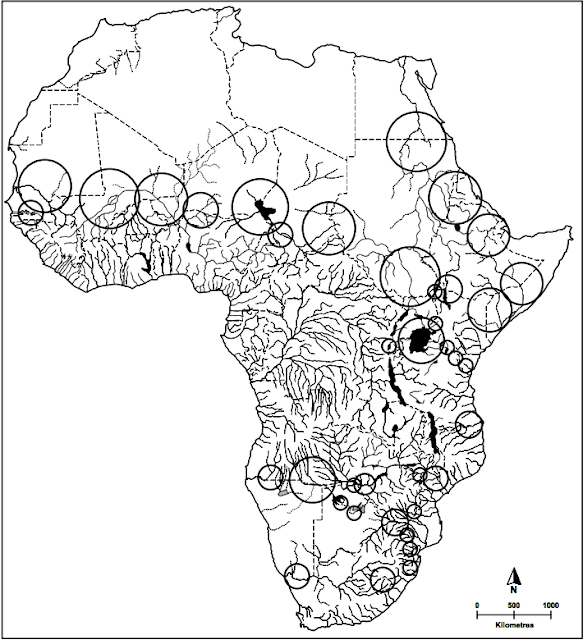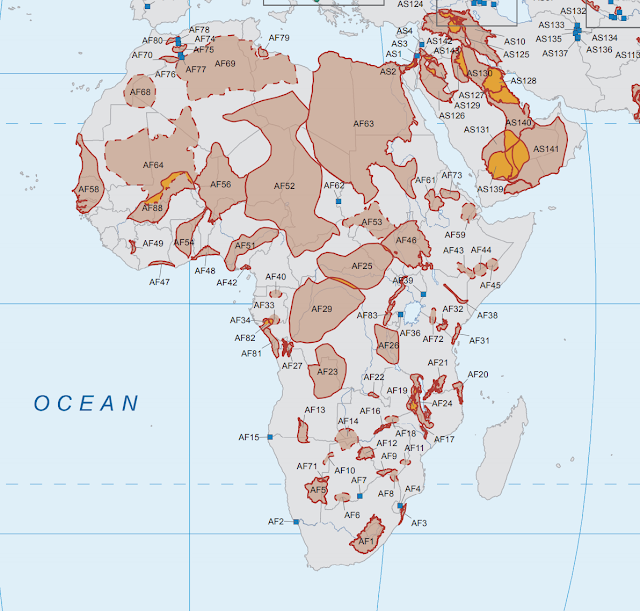Geopolitics and Biopolitics - A Critical Resource
As already discussed, water is fundamental to all forms of life on this planet but it's scarcity and uneven nature makes it highly politicised. Waters political nature is multi-scalar operating locally, nationally and internationally - water involves biopower, geopolitics and social inequality. Within this section of the blog I will explore the geopolitical and biopolitical underpinnings of this critical resource in relation to Africa.
A Geopolitical issue
Prominent water's resources often form the basis of many international borders as is clearly evident on the African continent. From the Zambezi river separating Zambia and Zimbabwe to the border which demarcates the Democratic Republic of Congo and Tanzania running halfway along Lake Tanganyika. Despite prominent water resources demarcating multiple borders on the African continent, national boundaries 'seldom' (Ashton 2007) align with the natural boundaries of river catchments or aquifers. The arbitrary formation of African borders remains a lasting colonial legacy (Ashton 2002) and this coupled with water's transgressive nature in which water flows freely ignoring jurisdictions generates friction and ensures water is a geopolitical issue.

Map of Africa showing major rivers and lakes and sites of disputes ("Size of circle reflect the relative spatial influenced by the dispute") - Source
The inter annual fluctuations in precipitation on the African continent result in variable distribution of Africa's water resources in both geographical extent and time (Ashton 2007) further accentuating disputes. As already discussed in the preceding post, Africa has 70 international rivers with ten international river basins shared by four or more nations (Kitissou 2007). Africa's water resources therefore must often be shared between multiple nations all vying to secure water resources for their own population and own development. Africa's geopolitical situation in regard to water has been generated by both natural and social forces. Colonial powers disregard for river catchment areas coupled with great inter annual fluctuations in precipitation have created an uneasy and difficult situation within the African continent.

Transboundary river basins of Africa - Source
A Biopolitical issue
Biopolitics is a concept which explores the way in which human life processes are managed under regimes of authority over knowledge, power and subjectivation. 'Biopower' (Foucault 1978) describes how the state is increasingly involved in the life processes of it's citizens. Both of these Foucauldian concepts can be understood in relation to water - water as a shared resource connects many individual bodies (Bakker 2012) and contemporary governments seek to optimize water resources to ensure the productivity of the population. Water exists as a natural infrastructure which is essential to the productivity and success of a nation, something which governments seek to harness. Sofie Hellberg (2018) uses the term 'Hydromentality' to illustrate the governing rationalities and techniques of ruling implemented by states to govern water use and water users. Hellberg (2014) used the eThekwini municipality in South Africa as a case study to illustrate the biopolitics of water. Hellberg examines how water service delivery impacts people's lives exploring the inequalities of water service delivery in which the poorest needs are 'merely administered' therefore not viewing themselves as 'true citizens' (Hellberg 2014:234). Water management therefore involves inclusion and exclusion as water is managed and redistributed - water is not just a question of management or technology but also 'social power' (Swyngedouw 2004). Water as a resource therefore exists in relation to 'biopower', different regimes of authority govern's its redistribution at a local scale which generates inclusion and exclusion leading to social inequality.
In summary, the fundamental resource of water has both geopolitical and biopolitical dimensions on the African continent. A strained geopolitical basis fosters power relations which are exerted as biopower. A 'hydromentality' exist's on the continent seeking to secure a scarce resource to ensure the productivity and success of nations. In my following posts I seek to use the geopolitical and Biopolitical basis of the African water resource to explore how African nations compete and cooperate in regard to a range of water resources from those which run on the surface to those which seep below ground.
A Geopolitical issue
Prominent water's resources often form the basis of many international borders as is clearly evident on the African continent. From the Zambezi river separating Zambia and Zimbabwe to the border which demarcates the Democratic Republic of Congo and Tanzania running halfway along Lake Tanganyika. Despite prominent water resources demarcating multiple borders on the African continent, national boundaries 'seldom' (Ashton 2007) align with the natural boundaries of river catchments or aquifers. The arbitrary formation of African borders remains a lasting colonial legacy (Ashton 2002) and this coupled with water's transgressive nature in which water flows freely ignoring jurisdictions generates friction and ensures water is a geopolitical issue.

Map of Africa showing major rivers and lakes and sites of disputes ("Size of circle reflect the relative spatial influenced by the dispute") - Source
The inter annual fluctuations in precipitation on the African continent result in variable distribution of Africa's water resources in both geographical extent and time (Ashton 2007) further accentuating disputes. As already discussed in the preceding post, Africa has 70 international rivers with ten international river basins shared by four or more nations (Kitissou 2007). Africa's water resources therefore must often be shared between multiple nations all vying to secure water resources for their own population and own development. Africa's geopolitical situation in regard to water has been generated by both natural and social forces. Colonial powers disregard for river catchment areas coupled with great inter annual fluctuations in precipitation have created an uneasy and difficult situation within the African continent.

Transboundary river basins of Africa - Source
A Biopolitical issue
Biopolitics is a concept which explores the way in which human life processes are managed under regimes of authority over knowledge, power and subjectivation. 'Biopower' (Foucault 1978) describes how the state is increasingly involved in the life processes of it's citizens. Both of these Foucauldian concepts can be understood in relation to water - water as a shared resource connects many individual bodies (Bakker 2012) and contemporary governments seek to optimize water resources to ensure the productivity of the population. Water exists as a natural infrastructure which is essential to the productivity and success of a nation, something which governments seek to harness. Sofie Hellberg (2018) uses the term 'Hydromentality' to illustrate the governing rationalities and techniques of ruling implemented by states to govern water use and water users. Hellberg (2014) used the eThekwini municipality in South Africa as a case study to illustrate the biopolitics of water. Hellberg examines how water service delivery impacts people's lives exploring the inequalities of water service delivery in which the poorest needs are 'merely administered' therefore not viewing themselves as 'true citizens' (Hellberg 2014:234). Water management therefore involves inclusion and exclusion as water is managed and redistributed - water is not just a question of management or technology but also 'social power' (Swyngedouw 2004). Water as a resource therefore exists in relation to 'biopower', different regimes of authority govern's its redistribution at a local scale which generates inclusion and exclusion leading to social inequality.
In summary, the fundamental resource of water has both geopolitical and biopolitical dimensions on the African continent. A strained geopolitical basis fosters power relations which are exerted as biopower. A 'hydromentality' exist's on the continent seeking to secure a scarce resource to ensure the productivity and success of nations. In my following posts I seek to use the geopolitical and Biopolitical basis of the African water resource to explore how African nations compete and cooperate in regard to a range of water resources from those which run on the surface to those which seep below ground.


Interesting description of Bipolar and Hydromentality. Especially the reference to Focauldian ideas is very relevant to the political struggles associated with water provision.
ReplyDeleteThank you Caroline, Hydromentality is an interesting concept exploring the way in which water use and users are managed so I agree that it does have relevance to political struggles associated with water provision. You can read more about 'Hydromentality' using the following link https://www.researchgate.net/publication/260604590_Water_Life_and_Politics_Exploring_the_Contested_Case_of_eThekwini_Municipality_through_a_Governmentality_Lens
Delete